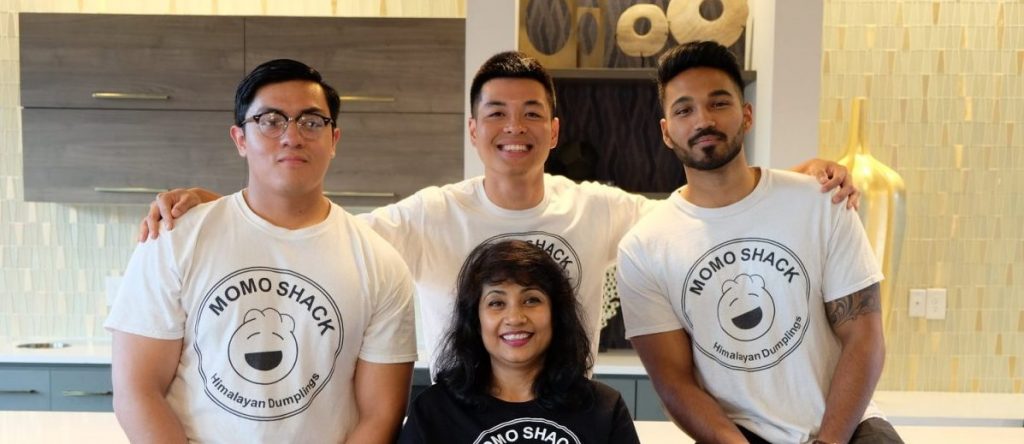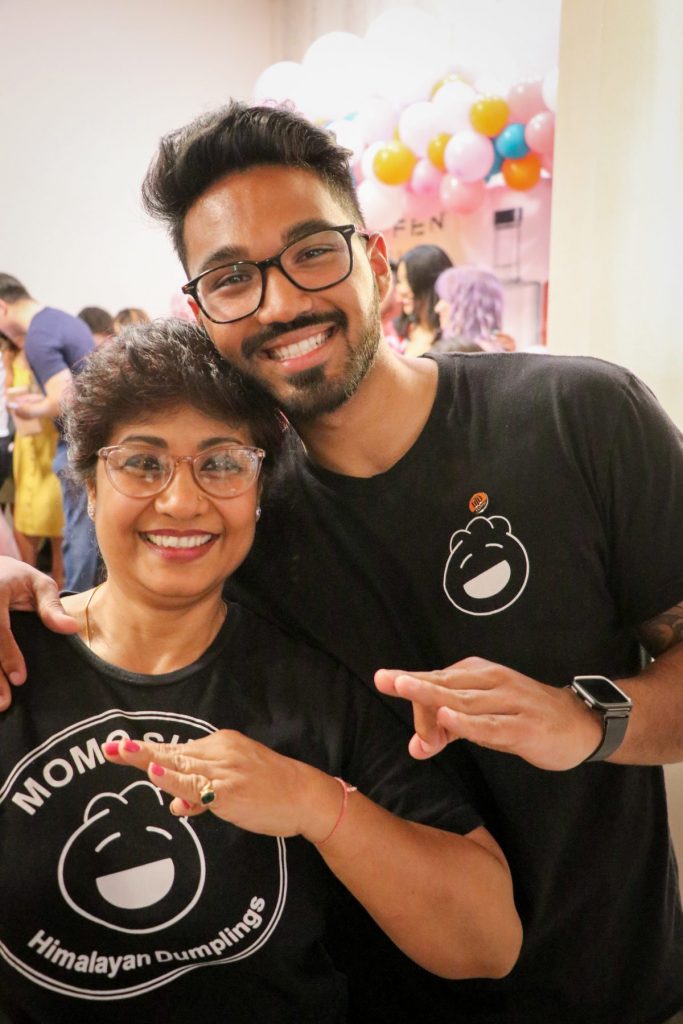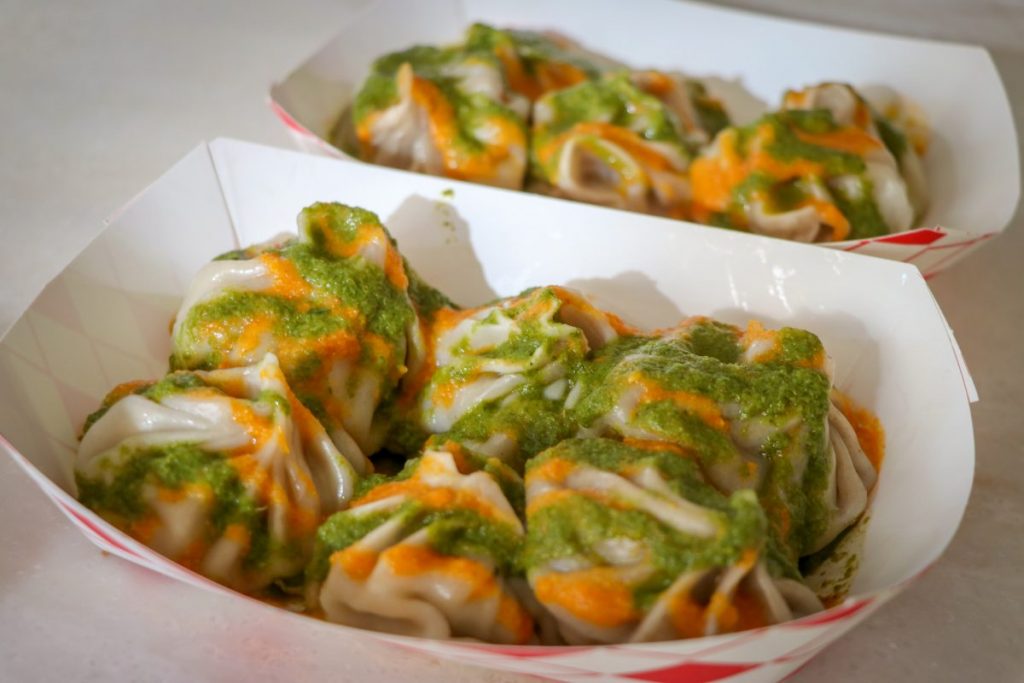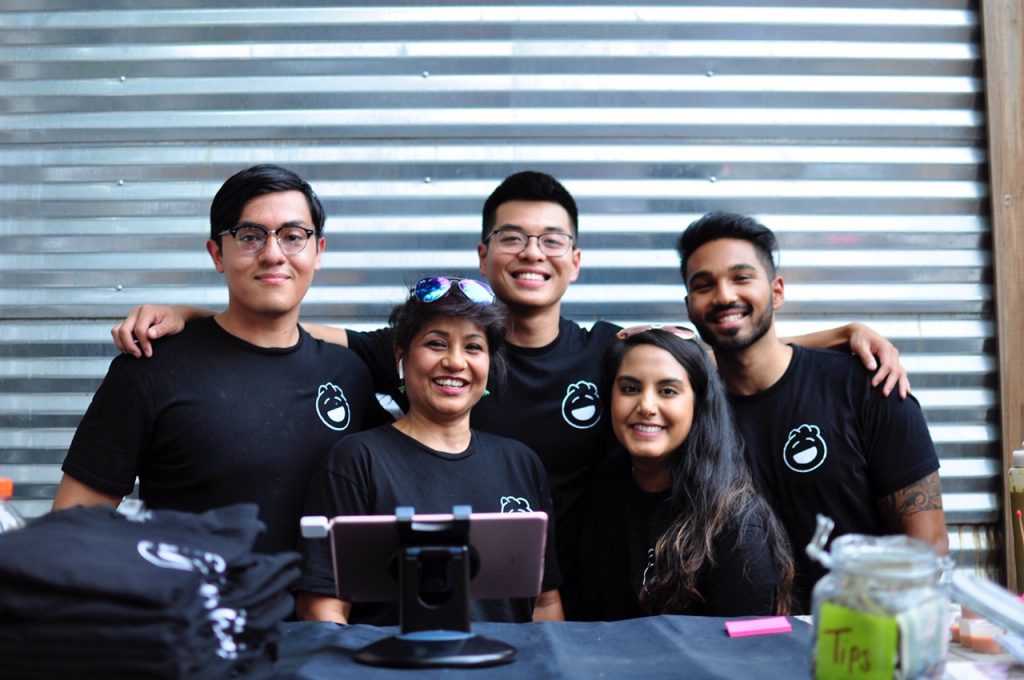Alumni Bring New Flavor, Nepali Dumplings to Dallas Diners
By: Development Communications | July 10, 2019
Alumni News

Nepal native Leezen Amatya BS’15 has been eating Nepalese dumplings, called momos, since he was a child. The UT Dallas graduate, now a business manager at JPMorgan Chase, was introduced to them by his mother, Minu, who was born and raised in Nepal.
“I couldn’t even tell you the recipe — it’s her secret,” Amatya said. “Growing up in Nepal, she really got into cooking. It’s something she did with my grandma and grandpa. Over the years, she’s kind of perfected it.”
So it wasn’t until Amatya and his family moved to the United States when he was 10 that he noticed a lack of momos in the Dallas-Fort Worth Metroplex.
“If I wanted them, my mom had to make them, or I had to go to Irving where there’s a dense Nepali population,” Amatya said.
Seeing a market opporunity, Amatya joined forces with with his mother and fellow Comets Thang Duong BS’15 and Daniel Flores BS’15 to start Momo Shack, selling their handcrafted creations at local markets and pop-up events.
Throughout middle school, high school and college, Amatya would introduce his mother’s homemade momos to friends, coworkers and classmates — all to rave reviews.

“Growing up, all I had were Chinese-style dumplings,” said Thang Duong BS’15, who met Amatya during freshman orientation at UT Dallas. “When I tasted Minu’s momos, I thought, ‘This is a lot of flavor I’m not used to.’ I really liked it and had never heard of them in Dallas.”
A solo trip to Nepal in 2017 reinforced Amatya’s affinity for his childhood home and his return prompted an idea to sell momos at local pop-up events and farmers markets.
“That’s when I really reconnected with my family, with my roots,” Amatya said. “I fell in love with the culture all over again. When I moved back here, I thought, ‘We have to do something that puts Nepal on the map’ and that’s what generated the idea for Momo Shack.”
Since launching in December 2017, the business has been a team effort.
“We all do a little bit of everything, from working the cash register to cooking, planning events and strategizing,” Duong said. “It’s very democratic in terms of responsibilities.”
The momos require many steps to make and assemble, from the chopping and mixing of ingredients to the folding of the dough.
“It’s something that requires all hands on deck,” Amatya said. “It’s so much work, because you have to make everything from scratch.”
Although Minu’s recipe is for her eyes only, key ingredients like cilantro, cumin and cabbage help create the signature flavor that goes into each variation. Momo Shack currently sells chicken, pork and veggie dumplings, available with a mix of two different “secret” sauces — spicy tomato and cilantro.

“It’s a unique food item that people haven’t really tasted,” Duong said. “It’s not just salt and pepper; it has a little bit of everything. A lot of people, no matter where they’re from, really enjoy it. They just didn’t know it existed before.”
In the fall of 2018, after just a year in business, Amatya, Duong and Flores were accepted into the Big Idea Competition, an annual startup competition hosted by the Institute for Innovation and Entrepreneurship at UT Dallas. The program allowed the partners to pitch their business plan to a panel of judges for cash and scholarship awards.
“Having that advice and that input from people who have been there was really valuable, especially for a small business like us,” Amatya said. “Even though we didn’t place, it was still a big win for us.”
The process gave Amatya, Duong and Flores the opportunity to fine-tune their business plan and think outside of the box in terms of their long-term goals.
“The judges showed us how to present ourselves in front of investors and hone in on all of the essential skills needed to generate revenue,” Duong said.
From farmers markets in Dallas, McKinney and Frisco to pop-ups at breweries and festivals, Momo Shack averages about three events a month. Although the business is currently a side gig for Amatya, Duong and Flores, the trio hopes to make it a full-time job with aspirations to operate out of a brick and mortar space.
“It’s definitely the dream,” Amatya said. “Just having the entrepreneurial spirit and turning it into a full-time gig that we could potentially make a living off of, that’s the motivation.”
All products of UT Dallas and children of immigrants, Amatya, Duong and Flores attribute their positive relationships with customers to the cultural diversity they exerienced on campus.
“You meet people from Nepal, you meet people from Africa and Peru and all over,” Duong said. “I was able to expose myself to different types of cultures and see what people like

outside of my own interests and biases.”
That shared experience also helps them connect with current and potential customers in person and on social media, where they have an ardent following.
“There are a lot of people who follow us on social media and show up where we’re going to be,” Duong said. “It really comes down to grassroots ideas and being able to relate to people through human experiences.”
Regardless of what the future holds for Momo Shack, the ability to share something new with others is what keeps Amatya, Duong and Flores motivated.
“Momo Shack is definitely about keeping an open mind and having positive vibes,” Amatya said. “It’s something Dallas/Fort Worth is finally starting to see. We’re putting Nepal on the map.”